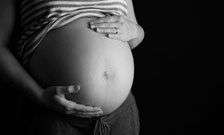Test for pre-eclampsia developed

(Medical Xpress) -- Scientists at King’s have pioneered a new method of identifying early in pregnancy which healthy first-time mothers are at risk of developing pre-eclampsia, a potentially life threatening condition that complicates one in 20 first pregnancies.
Pre-eclampsia is a hypertensive condition that can cause mothers to become very unwell with kidney or liver damage, blood clotting problems and seizures. This prototype test for the first time determines how a combination of possible risk factors can predict the likelihood of developing pre-eclampsia.
Researchers say although it needs validation, this test could improve detection rates of the pre-eclampsia, which will ensure a group of healthy first time mothers, who would otherwise not be identified as high-risk, receive the appropriate care to prevent the condition.
The study was funded by several organizations including the Foundation for Research and Technology, New Zealand, Tommy’s, the baby charity, and Guy’s and St Thomas’ Charity. The findings are reported in the British Medical Journal.
Worldwide approximately 70,000 women die from the condition each year. Babies born to women with pre-eclampsia have a three to 10-fold increased risk of death and a quarter are born premature. NICE guidelines to identify high risk women based on factors such as older age or high body mass index do exist, but at the moment there is no way to accurately identify which healthy women in their first pregnancy are likely to develop pre-eclampsia.
Led by Professor Robyn North, from the Division of Women’s Health at King’s College London, the team of researchers analysed the medical and family history, lifestyles and clinical examination findings of over 3,500 healthy first-time mothers participating in the SCOPE project, an international study in the United Kingdom, New Zealand, Australia and Ireland.
The findings
The study found that five percent of women developed pre-eclampsia, and of these women up to two thirds could be recognised as high-risk using a combination of clinical risk factors including: high blood pressure; high body mass index; family history of pre-eclampsia or coronary heart disease; their own birth weight; and early bleeding in pregnancy.
Factors found to be associated with reduced risk included: a previous single miscarriage with the same partner, taking at least 12 months to conceive, a high intake of fruit, cigarette smoking and alcohol use in the first trimester. The researchers caution that it is not yet known why these factors are associated with a lower risk in this study and expectant mothers should continue to follow Department of Health advice on keeping healthy in pregnancy.
The researchers proposed a framework for specialist referral using these factors, along with an ultrasound scan, that was able to identify half of the women who developed preeclampsia and went on to have a premature baby.
Professor Robyn North from King’s said: ‘Pre-eclampsia is a very serious condition, and if we could detect who is likely to develop it, then antenatal care could be tailored accordingly.
"We have developed a model which, for the first time, allows us to predict increased risk of pre-eclampsia for otherwise healthy first-time mums. We now need to validate the test in further studies, but this is the first stage towards creating a robust test which uses clinical information alongside blood tests to build a clearer picture of a woman’s risk of developing the condition.
"If it’s known that a mother is at high-risk of developing pre-eclampsia, then she can be offered the specialist care she needs right from the start. This will mean warning signs are picked up earlier, and any complications managed more effectively to prevent her health, and her baby’s health, from deteriorating."













